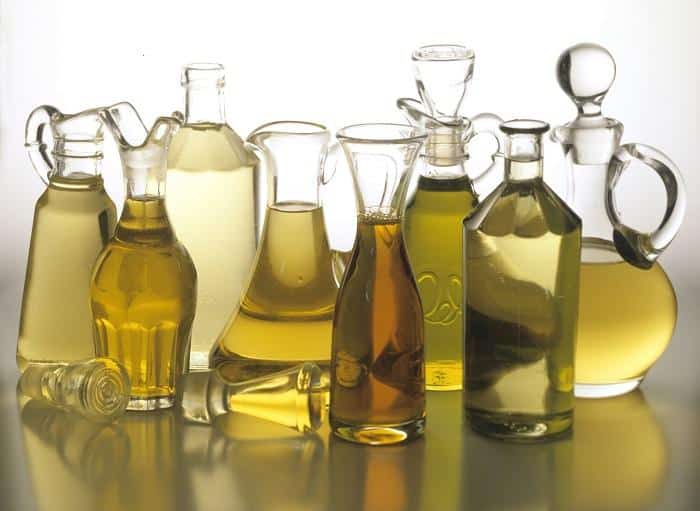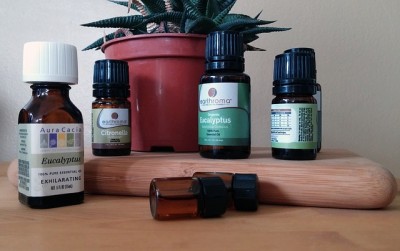As you likely already know, most essential oils must be diluted in a carrier oil before they can be applied to the skin.
However, carrier oils do far more than purely act as diluting agents. They are natural oils that even on their own, give brilliant nourishment to the skin. Made up of chains of different fatty acids, as well as vitamins and minerals, carrier oils ─ whether used alone or in mixology recipes with essential oils ─ are absorbed by the upper layers of the skin, leaving a nourishing and soft, silky finish.
Why Natural Vegetable Oils Are Good for Your Skin
In theory, you could simply use baby oil on your skin. Baby oil, however, is a mineral oil which is a synthetic petroleum by-product that only acts as a slippery barrier over the skin. Natural vegetable oils, on the other hand, are readily absorbed by the skin because they have tinier molecules, making them closer to sebum, the skin’s natural produced oil. Vegetable oils are food for the skin and they care for the skin at a deep level, helping with healing and with cell regeneration.
(Note: The carrier oil/essential oil mixture ratio will vary for each use or type of essential oil.)
Let’s take a detailed look at seven carrier oils:
Sweet Almond Oil
Sweet almond oil is one of the most commonly used carrier oils. It is pressed from the edible nuts of the sweet almond tree and is rich in both minerals and oleic acid, a skin nourisher and hydrator.
Here’s what you should know:
- Has a slippery feel, so it does need to be thoroughly massaged into the skin.
- Creates a smooth and silky feeling once absorbed by the skin.
- Softens undernourished or dry skin, encouraging cell renewal.
- Rejuvenates the skin and reduces fine lines.
- Lubricates the skin well, allowing for smooth massage movements.
- Perfect for baby’s skin as it is gentle and soothing.
- Good for cracked skin, rough heel or elbow skin and dry hands.
- Mixes well with any essential oil.
- *Do not use sweet almond oil if you have a nut allergy!
Apricot Kernel Oil
Apricot kernel carrier oil comes from the kernels of the apricot fruit. The fruit is a valuable source of beta-carotene, which the body converts to vitamin A, an essential immune booster and skin nourisher. It is produced by crushing the kernels, and the yield is very rich in oleic acid, a nourishing, fatty acid compound also found in olive oil.
Learn How To Make Powerful Herbal Medicines, Right in Your Kitchen! [2]
Here’s what you should know:
- Contains oleic acid, which makes this oil good for smoothing the skin and improving its texture.
- Rehydrates dry skin, especially when it is inflamed by the sun or wind.
- Can be used as a massage oil.
- Soothes minor skin irritations and is good for conditions such as eczema.
- Helps repair areas of extra-dry skin.
- Replenishes and rejuvenates mature skin.
- You can add your favorite essential oils to obtain your desired treatment or effect.
Sunflower Oil
The seeds from this great flower ─ which is the largest member of the daisy family ─ contain about 40 percent oil. When purchasing this oil, avoid processed, supermarket grade oil and instead choose unrefined organic oil, as it contains skin enhancing ingredients such as potassium, vitamins E and B, and omega-6 fatty acids.
Here’s what you should know:
- Is light textured but incredibly nourishing to the skin.
- Does not leave a residue behind, so it is perfect for the face.
- Protects and restores combination skins.
- Is a superb all-around massage oil.
- Vitamin E content helps heal blemishes and improve scar tissue.
- Ideal for restoring the appearance of tired-looking skin.
- Great for the repair of damaged hair with split ends.
- You can add your favorite essential oils to receive your desired treatment or effect
Grapeseed Oil
Grapeseed oil is pressed from the pips of grapes, as a by-product of wine-making. The oil is a pale green and extremely high in polyunsaturated fatty acids.
Here’s what you should know:
- High content of polyunsaturated fatty acids makes it light textured and easily
- Comes into its own when massaged into complexions that are well-lubricated, such as olive or darker skins, which have higher levels of their own natural oils.
- Leaves no residue behind and creates a smooth finish.
- Softens normal, oily and combination skin types.
- Is a smooth-flowing oil, so it is perfect for massages.
- Makes a fantastic, light body moisturizer for combination skin types.
- Excellent for smoothing away hard skin on the feet.
- You can add your favorite essential oils to create your desired treatment or effect.
Jojoba Oil
Wonderful, golden yellow jojoba oil comes from the beans of a tough shrub native to Arizona and Mexico. Native Americans have been using this oil for centuries to protect their skin from dehydration. It is actually a liquid wax that solidifies at cool temperatures and is similar in composition to sebum, the skin’s natural oil.
Here’s what you should know:
- Strengthens sensitive
- Good for a delicate facial treatment.
- Balances oily skin and clears acne.
- Helps reduce the appearance of long-term
- Applied regularly, jojoba oil softens and moisturizes dehydrated, dry or sensitive skin.
- Contributes to soothing and healing of skin damaged by psoriasis or
- Is a great facial cleanser as its waxiness dissolves away dirt and excess oils ─ helps reduce clogged pores.
- Can be used alone but also blends well with most essential oils.
Avocado Oil
The oil from the flesh of the avocado pear had been used as a beauty treatment for hundreds of years. It is rich green, as it still contains chlorophyll ─ the pigment that gives plants their hue. Avocados contain the skin-nourishing vitamins A and D, as well as linoleic acid, which strengthens the cell walls, making skin stronger.
Here’s what you should know:
- Oil is viscous and absorbs slowly into the skin.
- Acts as a mild, natural sunscreen.
- Excellent for extremely dry skin on the face, but remember that it takes longer to absorb, so it is good to use as an overnight moisturizer.
- Nourishes complexions that have been depleted by the sun, heat or wind
- Applied nightly, this oil can slow down the degeneration of the skin which helps reduce the visible signs of aging.
- Repairs damaged skin, especially good for the elbows, knees and heels.
- Helps repair damaged and split
- You can add your favorite essential oils to receive your desired treatment or effect.
Aloe Vera
Aloe is a succulent plant with no stem and has fleshy leaves containing sacs filled with a healing juice. This juice has been used for medicinal properties for more than a thousand years. You can use aloe vera, fresh from the plant or make sure always to buy aloe vera that is at least 95 percent pure.
Here’s what you should know:
- Fresh from the plant, the gel can be applied to burns, cuts, wounds and sunburn with rapid anti-inflammatory and skin healing results.
- Calms angry red skin.
- Cools skin reactions resulting from sensitivity or allergy.
- Heals skin that has been affected by eczema, psoriasis or shingles.
- Excellent for the treatment of acne.
- Great to use an natural, hair mouse.
- Perfect to use as an aftershave gel.
- Helps heal and calm rashes like hives or poison
- You can add your favorite essential oils to obtain your desired treatment or effect.
These carrier oils, as well as others not mentioned here, are necessary as bases to make aromatherapy blends using your essential oils. They make great massage and treatment blends using the mixology of essential oils.
What advice would you add on carrier oils? Which do you use? Share your tips in the section below:

